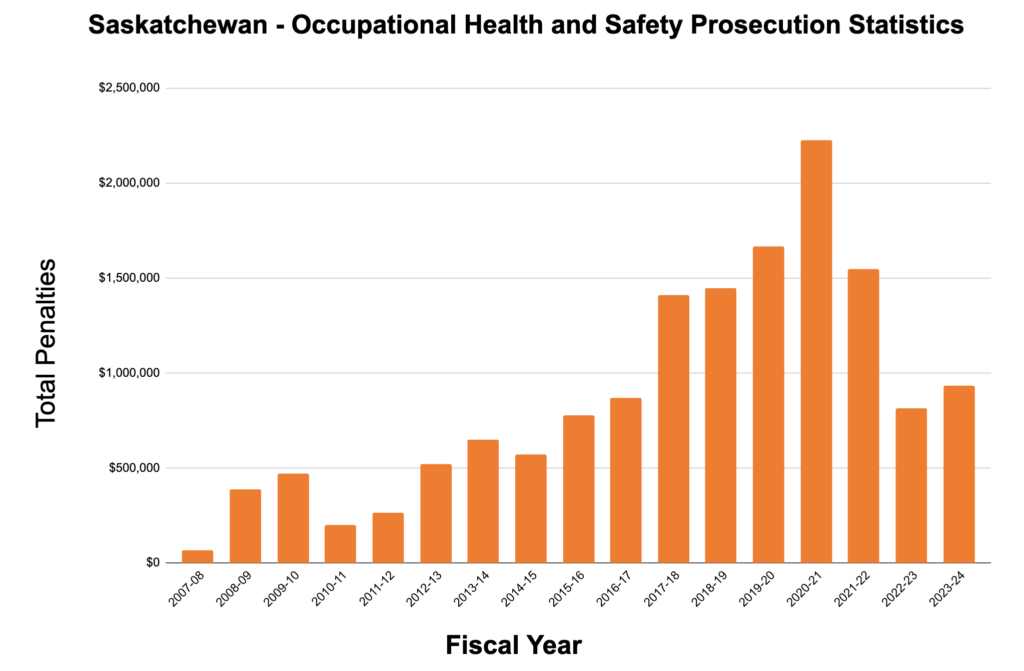In Saskatchewan’s technical sectors, the commitment to Occupational Health and Safety (OHS) compliance transcends regulatory obligations; it stands as a foundational pillar of responsible business conduct. This post explores the pivotal role of OHS compliance, emphasizing its strategic significance for organizations in technical domains, where the consequences of non-compliance are more pronounced.
In technical industries, the pursuit of OHS compliance isn’t merely a checkbox exercise; it’s a strategic imperative. The complexities inherent in these sectors heighten the importance of safeguarding the health and safety of the workforce. Compliance, therefore, emerges not only as a legal prerequisite but as a proactive measure to shield both employees and organizational viability. Beyond employee well-being, failure to adhere to OHS regulations exposes organizations to substantial liability risks.
Since 2016-17, there has been an average of 19 OHS prosecution convictions every year in Saskatchewan. The value of the convictions range from $1,400 to $575,000. The table below shows the OHS total prosecutions in Saskatchewan from 2007-08.

If you look at the details of the prosecutions, several of these convictions are the result of failing to provide the proper training:
Addressing the risk of non-compliance with these safety clauses poses a signficant challenge for companies. The intricacies of adhering to the stipulations within these clauses involve a nuanced approach. Providing comprehensive information, instruction, training, and supervision as mandated requires a deep understanding of the unique aspects associated with each job role.
Ensuring that exclusively trained operators handle equipment demands not only initial training but also the establishment of a robust system for ongoing competency verification. Moreover, the obligation to ensure that workers are adequately trained in all essential health and safety aspects at the commencement of their employment necessitates a meticulous onboarding process. The challenge is further compounded by the dynamic nature of technical industries, where the constant evolution of technologies and regulations necessitates the continuous adaptation of training programs. Companies must grapple with these challenges to instill a safety culture that not only aligns with regulatory standards but also actively preserves the well-being of their workforce.
Organizational leaders play a critical role in steering their teams toward compliance, competence, and overall success. Effectively managing training initiatives and implementing streamlined tracking mechanisms requires strategic foresight and proactive engagement. Here are key strategies for leaders to navigate the challenges:
Leaders must spearhead the creation of holistic training programs that go beyond mere compliance checkboxes. Collaborate with subject matter experts to identify job-specific skill sets and knowledge requirements. This ensures that training is tailored to the nuanced demands of each role, fostering not just compliance but genuine competence among team members.
Leverage technology to enhance the training experience. Invest in e-learning platforms, virtual simulations, and interactive modules. These tools not only make training more engaging but also facilitate remote learning, allowing employees to progress at their own pace. Embracing technology enhances the effectiveness and accessibility of training initiatives.
Implement regular assessments to gauge the effectiveness of training programs. This involves quizzes, practical assessments, or simulations to evaluate comprehension and practical application. Additionally, establish feedback loops where employees can share their insights on the training process. Continuous assessment and feedback enable leaders to refine and improve training strategies over time.
Invest in robust certification management systems to streamline the tracking of employee certifications and training progress. These systems centralize data, providing leaders with clear insights into who has completed which training modules and when certifications are due for renewal. Automated reminders ensure timely updates, reducing the risk of non-compliance.
Leaders should consider deploying Learning Management Systems (LMS) to centralize and organize training initiatives. An LMS provides a centralized platform for creating, managing, and tracking training content. It also offers analytics on employee progress, facilitating data-driven decision-making for refining training strategies.
Leadership plays a crucial role in fostering a culture of continuous learning. Encourage employees to pursue additional certifications and stay current in their field. This not only contributes to ongoing professional development but also signals to regulatory bodies a commitment to staying ahead of industry trends and ensuring compliance.
Align training programs with career development pathways. Clearly communicate how completing specific certifications and training modules contributes to individual professional growth within the organization. This alignment not only provides purpose for employees but also enhances motivation to actively engage in training initiatives.
Recognize that effective training and tracking require resource allocation. Proactively allocate budget, time, and personnel to support comprehensive training programs and the implementation of tracking mechanisms. This proactive approach positions the organization to address compliance challenges with resilience.
In conclusion, organizational leaders in technical industries must adopt a multifaceted approach to managing training and tracking challenges. By designing holistic training programs, embracing technology, implementing robust tracking systems, and fostering a culture of continuous learning, leaders can navigate the complexities of compliance, competence, and organizational success.
Variable Hub was specifically designed to help organization centralize training, certification and requirement management. Our aim is to simplify the complexity of assigning, tracking and verifying these requirements.
If you would like to learn how Variable Hub can help your organization, please contact us for a demo.